COTI Overview Document - part II
(continued from part I)
3.3 Mediation System
The Mediation System serves three main objectives: decentralised governance, security and reliability. In order to provide buyers and sellers with protections against errors, fraud and counterparty abuse, mediators must take responsibility if disputes arise within the network.
While the Trust Score adds a layer of trust to all COTI network transactions and imposes disincentives on behaviour that is dishonest or unfair, the Mediation System provides an additional mechanism that facilitates dispute resolution in an effective and cost-efficient manner.Typical scenarios requiring mediation include the following:
- Billing errors. The buyer completes a purchase, but later realises that the amount paid for the goods or services was incorrect.
- Inadvertent transfers. The user inadvertently sends funds to the wrong party.
- Unauthorised charges. The user is charged an amount without having authorised the transaction.
- Undelivered goods or services. The buyer pays a merchant for goods or services but the delivery of those goods or services is not fulfilled.
- Non-conforming goods or services. The buyer pays for and receives the goods or services, but the goods or services do not conform with the description or standards the seller conveyed at the time of the purchase.
In each of the above scenarios, if the sender and receiver of funds are unable to resolve the dispute directly, the unsatisfied party can initiate mediation.
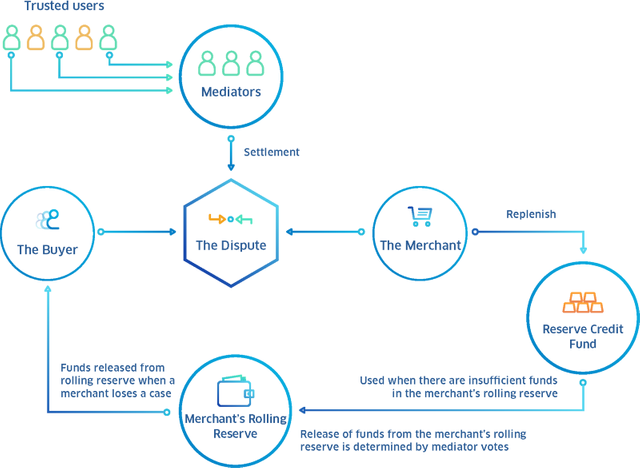
The role of mediators
As Bitcoin’s inventor Satoshi Nakamoto observed, one of the shortcomings of traditional payment systems is that, in providing mediation services, payment providers necessarily incur significant costs, which result in higher transaction fees. Thus, a key challenge was determining how to provide buyers and sellers with robust safeguards in a streamlined, cost- efficient manner.
COTI’s approach to mediation involves harnessing a decentralised and distributed group of independent mediators to resolve disputes. Mediators work independently to validate real world information pertaining to transaction disputes and then cast votes on a mediated outcome. Mediators receive caseloads and cast their votes using the mediator client (presented in 4. Applications & Services). They are not able to communicate with one another and are unaware of how many other mediators are involved in resolving a dispute.
The method for determining consensus is underpinned by the game theoretic notion of Schelling points (i.e., focal points). The rationale here is that mediators are encouraged to reach similar conclusions on a dispute and, in the absence of being able to coordinate, to look for focal points that provide the truest proof of events that occurred between the buyer and the seller. In effect, the system relies on appealing to the intuition of each mediator.
After mediators’ votes have been cast, they are assessed using a voting matrix that determines consensus automatically. Once a mediated outcome has been arbitrated by a quorum of mediators, the system compensates the winning party and returns that party’s balance to its rightful state.
If the customer is the winning party, he/she is remunerated using funds from the merchant’s rolling reserve. In case of insufficient rolling reserve funds, compensation is remitted from the Reserve Credit Fund (RCF). When the merchant is the winning party, on the other hand, no further action is needed.
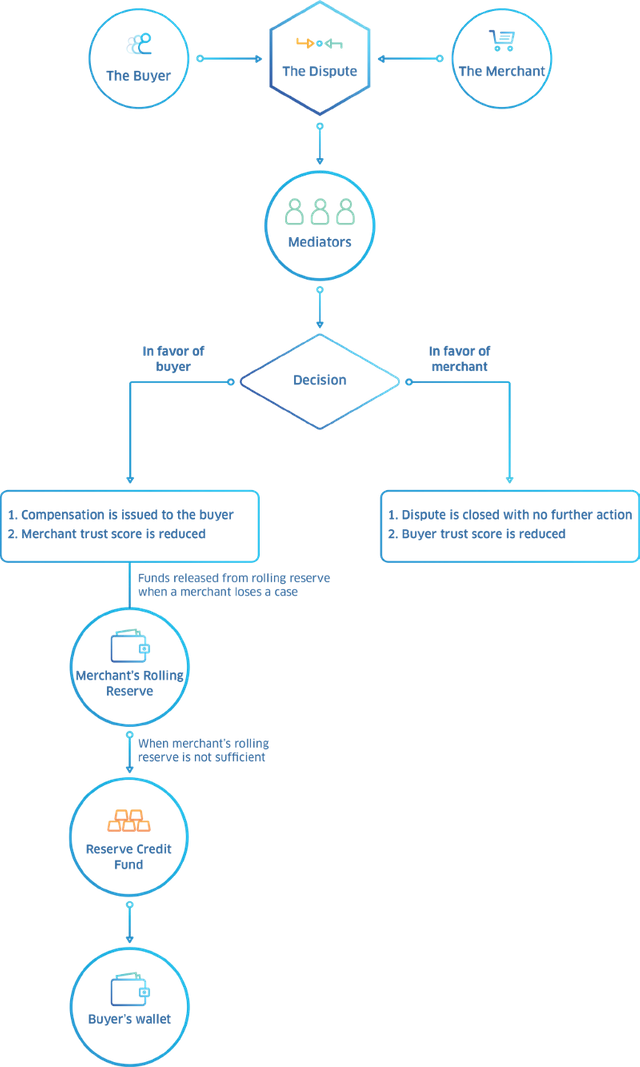
Main components of the COTI Mediation System
Merchant rolling reserve
Rolling reserve requirements are calculated based on the merchant’s turnover and Trust Score. Because of the design of the COTI payments network, Mediation System and decentralisation, the rolling reserve requirements are substantially lower than existing payments networks.
Every merchant transaction will incur a rolling reserve fee that is reserved for a number of days. When the rolling reserve term has ended, funds are released back to the merchant’s account.
The rolling reserve is used when a merchant has lost a mediated dispute and is required to compensate the consumer. Merchants that do not meet the rolling reserve requirements will forfeit their ability to sell goods and services within the COTI network.
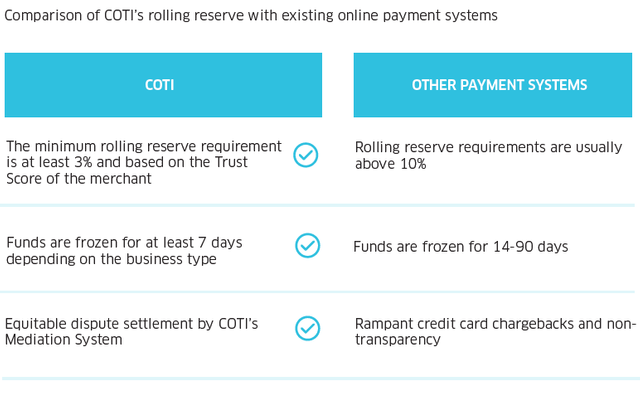
Other mediation provisions
To ensure the Mediation System is cost-effective and consistently achieves dispute resolution in a manner that benefits the network overall, COTI has taken several additional factors into consideration.
Mediator recruitment and training. Individuals who wish to register as mediators must satisfy certain requirements before being admitted to the mediator platform. Among other requirements, mediators must demonstrate relevant language proficiency and undergo an online assessment to determine they have the aptitude to perform the mediation tasks at a high standard. COTI endeavours to make mediation open to a broad group of people and will make available online training programs that can assist candidates in acquiring the requisite knowledge for contributing to the dispute resolution process effectively.
Collusion prevention. Due to its distributed nature, the Mediation System needs to account for the prospect of mediators engaging in collusion — either with one another, or with one of the parties in a disputed transaction. This risk of collusion is mitigated primarily through the algorithms that determine which mediators are assigned to a specific dispute, whereby caseloads are routed intelligently to mediators who have the least likelihood to collude with one another. If mediators are found to have engaged in any form of collusion, they will be severely penalised.
Privacy concerns. Prior to distributing caseloads, COTI takes measures to ensure that only the data that aids directly in dispute resolution is disclosed. By default, COTI removes personal identifying information from all data submissions. If the parties to a dispute so choose, they can elect to forgo privacy for the sake of providing richer data. During the mediator registration process, all mediators are required to read and accept a mediator privacy policy, any violation of which will result in expulsion from the COTI network.
3.4 Native Currency (COTI)
COTI’s native digital currency sits at the centre of the COTI network and fuels the interactions between consumers, merchants, mediators and node operators. COTI was purpose-built to overcome the barriers that have limited the widespread adoption of digital currencies in day-to-day payments.The primary function of COTI coins is to serve as the common denominator of payments, fees and mediation and to incentivise node operators in the COTI network:
- Payments. COTI coins function as a medium of exchange that can be used when making and receiving payments in the COTI ecosystem. While the COTI network supports multiple fiat and digital currencies, participants are incentivised to use COTI over other currencies for its efficacy as a payment method and low-to-zero transaction fees.
- Mediation. Mediator stakes and payouts are denominated in COTI coins. As such, mediators are required to hold COTI coins whenever they wish to engage in mediation.
- Merchant rolling reserve. A share of a merchant’s transactions that is temporarily set aside to cover potential business risks, such as when a merchant loses a mediated dispute and must compensate the consumer. Rolling reserve funds are denominated in COTI coins and automatically accumulate in the merchant’s account for a defined term.
- Node operators. Operators of all node types will be incentivised in COTI coins and will be required to hold COTI whenever they wish to validate node activity.
- Fees. All fees incurred in the course of using the COTI network (payments, mediation, node oversight and external projects based on COTI’s Cluster) are payable in COTI coins.
The aspiration is for COTI to become widely adopted for general payment purposes — to become the Currency Of The Internet. Scalability will not serve as the sole catalyst of adoption, as Austrian School economist Ludwig von Mises posited in his regression theorem10, in order for a currency to reach the point of being widely accepted as a general medium of exchange, it first needs an objective framework for determining its price.
Although value transfer is the COTI coin’s primary function within the COTI network, it will also be used as a means of paying fees and incentivising mediators and node operators. The above provides an objective framework that will determine COTI’s price in relation to other currencies.
3.5 Currency Exchange
COTI aims for its payments network to be versatile with respect to currencies, thus providing an easy- to-use payment solution. To this end, COTI is developing a currency exchange that provides network participants with continuous access to liquid markets in a range of digital and fiat currency pairs.
The main functions of the exchange are three-fold.
- First, it serves as an enabler of cross-currency payments by providing network participants a straightforward mechanism for paying or receiving funds in whichever currencies they choose, regardless of their counterparties’ preferred currencies.
- Second, it provides end-users with a direct mechanism for transferring their holdings from one currency to another, if for whatever reason end-users wish to increase or reduce their exposure to a specific currency.
- And third, it is an enabler of the market-making activity in which COTI’s native currency serves as the common denominator amongst all other currencies.
Seamless interoperability
COTI abstracts the complexity of currency exchange from end-users. The exchange functions as a foundational layer of COTI’s applications and services, operating in the background to ensure that participants’ currency exchange requests are fulfilled automatically in response to the actions taken from the consumer, merchant and mediator interfaces. For each order, rather than presenting an order book and bid/ask prices, the user is presented with a single fixed rate, inclusive of any fees.

Simplified depiction of the COTI network’s liquidity flows
Global order book
Behind the scenes, the exchange works for end-users to provide the best fulfilment and execution possible while guaranteeing that the originally- quoted rates are adhered to. COTI achieves this by amalgamating multiple liquidity sources to create a global order book. For a visual representation of the exchange’s liquidity flows, please refer to Exhibit 3.
When generating quotes based on the order books of multiple exchanges, COTI uses ‘look ahead’ algorithms to predict the rates it can honour. Upon receiving an order, the exchange works through its global order book, allocating quantities that need to be reserved across COTI’s exchange and third party exchanges to ensure the order is filled successfully.
Security and fault tolerance
COTI’s exchange is designed to be highly secure and fault-tolerant. The exchange implements a multi-tiered security architecture that limits attack vectors and attack ingresses. All traffic in COTI’s exchange is encrypted end-to-end using Transport Layer Security (TLS) 1.2 (utilising SHA256 keys), and all data-at-rest is secured with AES-256 encryption. Each step in the currency exchange process is transactional, such that if any part of a step in the exchange process fails, the entire step fails.
COTI’s exchange is first and foremost a component for facilitating cross- currency payments in a way that is maximally beneficial for network participants. It serves the secondary function of providing users with a means of adjusting their exposure to different fiat and digital currencies, and connects seamlessly to all of COTI’s applications. Over time, additional exchange functionality will be added to accommodate more elaborate use cases — for example, adding support for a wider array of order types.
3.6 Decentralised Governance
To provide a decentralised ecosystem for online payments, COTI will explore various decentralised governance models. Such governance will provide voting rights for executing changes in COTI’s base protocol and deciding future use cases of the COTI coin. Futarchy governance is one such methodology that utilises a team of experts who work to define metrics for implementing new developments. COTI coin holders can then collectively vote for the best possible outcome to reach a decision based on the wisdom of the crowd.
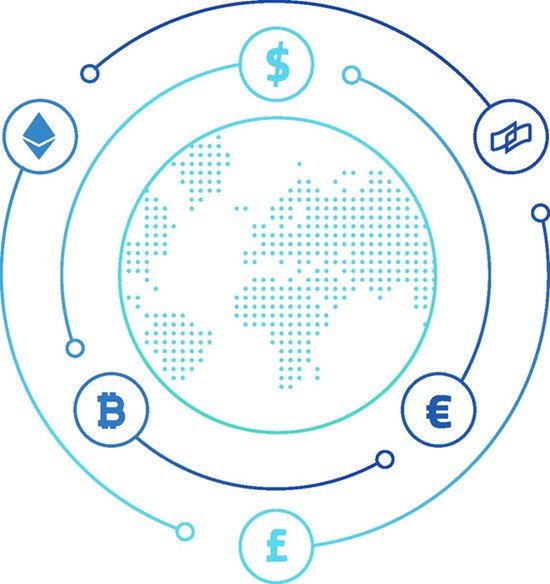
4. Applications & Services
COTI is developing a suite of applications and service offerings that will provide consumers, merchants and mediators with seamless connectivity to the COTI network.
4.1 For Consumers
The first pillar of the COTI network’s success is the extent to which it establishes a critical mass of consumers equipped to use its payment solutions for peer-to-peer payments and merchant payments alike. To this end, COTI is developing consumer offerings that will provide user- friendly gateways to a range of payment-related services, encompassing both fiat and digital currencies. Because the relative complexity of digital currencies has inhibited their widespread adoption in payment use cases thus far, a primary focus of COTI’s application design efforts has been on making digital currencies as easy to acquire and use as their fiat equivalents.
Wallets
COTI’s main consumer offering is a multi-currency wallet that provides instant and easy access to the COTI payments network and supports a variety of consumer payment use cases.
- Peer to peer transactions. COTI users will be able to make instant, secure transfers to their peers who hold COTI wallets. Transfers will be instant with low-to-zero fees (depending on the users’ Trust Scores and currency selections).
- Nearby wallet-to-wallet transactions. COTI wallet holders will be able to send funds in a secure, instant and intuitive manner to other COTI wallet holders through close physical proximity.
- Storing digital and fiat currencies securely. COTI users will be able to use their COTI wallets as de facto bank accounts for the purpose of holding funds in both digital and fiat currencies. In the first instance, funds can be deposited into COTI wallets using card, bank wire and several leading digital currencies.
- Exchanging digital and fiat currencies. COTI users will be able to use their wallets to move funds from one currency to another by posting market or limit orders to COTI’s exchange. The currencies supported at the outset will include USD, EUR, GBP, and several leading digital currencies, including COTI’s native currency.

The COTI wallet is being developed as a native mobile application and as a web application accessible via COTI’s website. Users will be able to open wallets via the COTI website and applications, as well as during the checkout procedure on COTI-powered merchants’ websites.
Debit cards
To connect the COTI network with other payment rails, COTI is offering users access to debit cards that link directly to COTI wallets. The rationale for offering these cards is that they will enable users to effect payments from their COTI wallets when dealing with merchants that have not yet integrated with COTI.
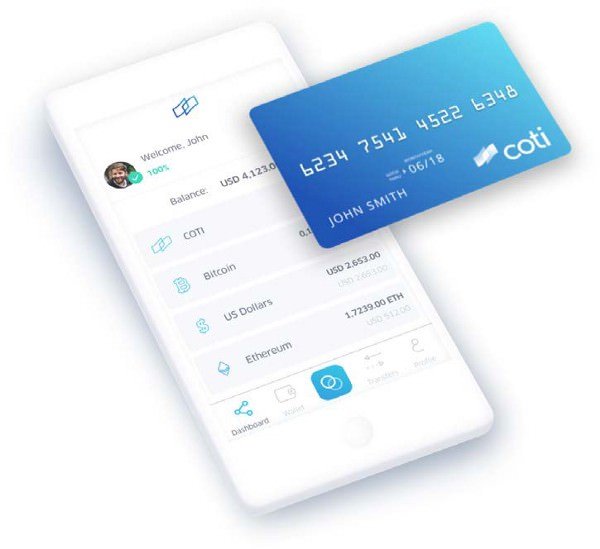
COTI users will be able to specify their preferred currency each time they create a virtual debit card. When a purchase is made using a card linked to a currency that does not match the payment currency, COTI’s exchange will automatically convert the required amount of the card- linked currency to the purchase currency, thereby mitigating third-party currency exchange fees.
The relative complexity of digital currencies continues to undermine their adoption by mainstream consumers. The COTI team aims for its consumer offerings to abstract this complexity from end-users, with a view to increasing digital currencies’ mainstream adoption.
In addition to supporting a variety of payment, storage and exchange use cases, COTI’s wallet will provide an ideal entry point for mainstream consumers looking to venture into the digital currency domain for the first time.
4.2 For Merchants
The second pillar of the COTI network’s success is the extent to which it can attract and retain a large base of merchants that accept payments using COTI’s rails. To this end, COTI is developing a suite of merchant tools and services that make COTI a compelling proposition for merchants, as an addition to, or as a replacement for, their existing payment systems.
Processing tools
COTI is developing processing tools that will enable merchants to start accepting payments from COTI wallet holders. Consumers who visit COTI- powered merchants’ websites, but do not hold COTI wallets, will be invited to open wallets instantly as part of the checkout process. Merchants will be able to choose whether they wish to connect to COTI’s payment rails via API or by embedding an iFrame into their websites. The merchant onboarding process will be streamlined to the point that integration can be completed within a few hours. The integration process will be made simpler by the fact that COTI’s processing solutions will be compatible with several widely-adopted e-commerce platforms (e.g., Shopify and Magento).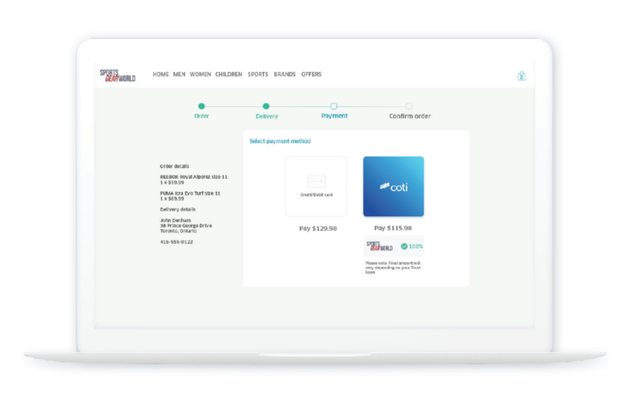 COTI-powered merchants will have access to a dashboard that provides detailed data and reporting functionality on their COTI network transactions. Within this dashboard, merchants will choose which COTI- supported currencies they wish to accept, as well as their preferred settlement currencies. Moreover, the dashboard will provide merchants with wallet-like functionality that enables them to make payments to COTI wallet holders and to other COTI-powered merchants, as well as to use COTI’s currency exchange facility. Merchants will also be able to run their own full node with a customised wallet to streamline the transactional experience for customers.
COTI-powered merchants will have access to a dashboard that provides detailed data and reporting functionality on their COTI network transactions. Within this dashboard, merchants will choose which COTI- supported currencies they wish to accept, as well as their preferred settlement currencies. Moreover, the dashboard will provide merchants with wallet-like functionality that enables them to make payments to COTI wallet holders and to other COTI-powered merchants, as well as to use COTI’s currency exchange facility. Merchants will also be able to run their own full node with a customised wallet to streamline the transactional experience for customers.
As COTI’s network grows, COTI will introduce additional solutions for merchants, including supplier and employee payments, thereby enabling merchants to carry out a greater variety of payment functions from within the COTI network.
Hedging services
COTI recognises that one of the barriers preventing merchant acceptance of digital currencies is the volatility they may be exposed to between the time a payment is received and the time of settlement. COTI will remove this barrier by providing COTI-powered merchants with access to hedging services that enable them to reduce, or eliminate, their exposure to near- term currency fluctuations.
— To mitigate a merchant’s exposure to fluctuations in COTI’s price, put options will assist merchants with securing future exchange rates. In the early stages, these hedging services will initially be limited to a 30-day period and will only cover payments denominated in COTI coins. A Black-Scholes option model will be used for the put option price, while the option premium will be calculated based on the option strike price, the option term and COTI’s price volatility.
A simplified example of a 30-day option contract that would enable a merchant to hedge its downside exposure to COTI relative to the USD, together with a simplified depiction of the option’s hypothetical payoffs, is provided in Exhibit 4: Simplified example of a 30-day put option.
— COTI will create an internal derivatives market that enables network participants to enter forwards contracts and buy and sell put/call options that are denominated in COTI coins. Over time, derivative pairings, such as COTI/USD, will be expanded to meet market developments.
COTI will assist derivative market participants in mitigating counterparty risk. When entering forwards contracts or selling call/put options, market makers will be required to deposit collateral into a special margin account that is denominated in COTI coins. The margin requirement will be lower for network participants with high Trust Scores and higher for those with low Trust Scores.

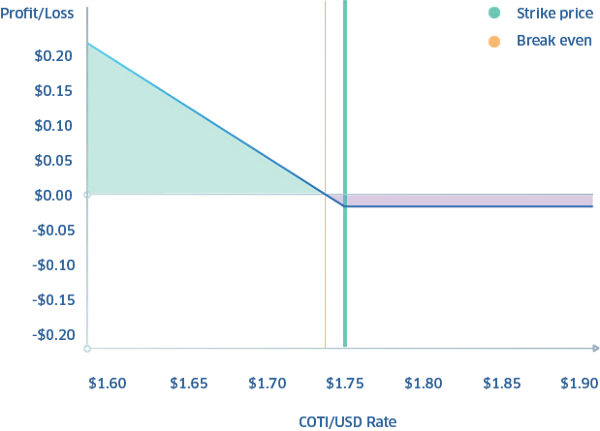
Simplified example of a 30-day COTI put option
4.3 For Mediators
The third pillar of the COTI network’s success is the extent to which it can attract and retain a sufficient volume of capable mediators to address the volume of disputes occurring in the network at any given time. In addition to having sufficient economic incentives, as described in section 3.3: The Mediation System, mediators require tools to facilitate their contributions to the dispute resolution process.
COTI is developing a separate application to accommodate mediator use cases. The mediator application will largely resemble the consumer wallet, but will offer enhanced functionality that enables mediators to serve their roles effectively. Amongst other functions, the application will allow mediators to accept invitations to receive and review caseload data, to place wagers, and, in the event of successfully contributing to a mediated outcome, to receive payouts in COTI.
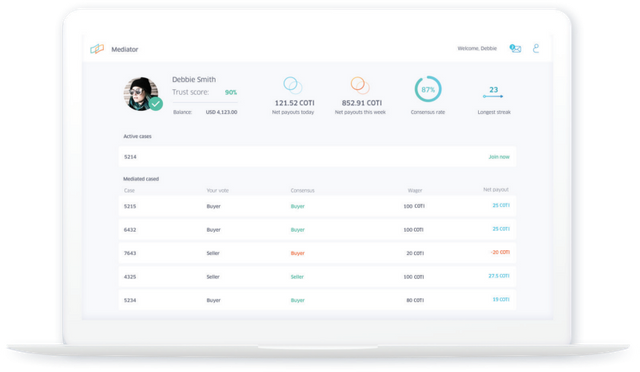
4.4 External Projects
The COTI network will enable external projects to build their applications based on COTI’s innovative distributed ledger technology. To this end, COTI is developing a suite of tools, services and incentive programs that will support third parties with migrating their technology to COTI’s base layer protocol.

5. Regulatory Approach
COTI’s legal advisors are laying the licencing and regulatory foundations that will enable the COTI network — and its native currency, COTI — to achieve global scale and reach. While the digital currency landscape is currently characterised by a high degree of regulatory uncertainty, the COTI network stands to benefit from the onset of new digital currency-specific regulations.
Early adopters of digital currencies have long held the view that digital currencies will continue to thrive outside the strictures of governments. The COTI team’s somewhat contrarian view is that, like the Internet before it, digital currencies will only come of age — and yield the greatest benefits to consumers and businesses — by operating within the bounds of the laws and regulations of sovereign states.
In order for digital currencies to achieve widespread adoption in payment, digital currency-related organisations — whether decentralised or not — they will need to adhere to the laws and regulations of the jurisdictions in which their end-users reside. And in the absence of digital currency- specific regulations, organisations should take a proactive approach by adhering to the know your customer (KYC), anti-money-laundering (AML) and Treat Clients Fair (TCF) standards, which are now commonplace in the provision of financial services-oriented activities.
Although digital currencies today are largely unregulated, regulatory authorities in several jurisdictions have grown increasingly outspoken about their intentions to implement digital currency-specific regulatory regimes. Some jurisdictions — including Ecuador and Bangladesh — have altogether banned the use of Bitcoin and other digital currencies. However, much of the recent regulatory attention has centred on initial coin offering warnings and the People’s Republic of China’s ban on it all together.
To promote the onset of suitable digital currency-specific legislation, the COTI team and its legal advisors are working with regulators globally to help shape the relevant regulatory frameworks and to share COTI’s experiences as a global digital currency initiative.

Licensable activity
Certain aspects of the COTI network’s activity relate to the provision of digital wallet and exchange services, both of which are licensable activities in the jurisdictions examined. As such, COTI is pursuing licence authorisations globally in respect of the following:
• Payments and money services. Such licenses cover the provision of merchant processing solutions in fiat currency, enabling COTI-powered merchants to accept payments in digital and fiat currencies.
• Exchange and e-wallet services. Such licences cover the provision of exchange and wallet functionality, enabling COTI to provide individuals and merchants with the ability to hold, exchange and transact in digital currencies.
Pursuant to advice from its legal advisors, the COTI network will expand its licence portfolio to ensure maximum geographic coverage.
AML and KYC procedures
The COTI network is adopting appropriate AML and KYC procedures to ensure that its network cannot be used to facilitate money laundering or other illicit activity. COTI is inherently not conducive to money-laundering, as any user of COTI’s wallet, exchange or processing solutions must undergo strict onboarding procedures. Notwithstanding its commitment to AML and KYC, COTI is similarly committed to protecting user privacy and has appropriate consumer data protection mechanisms in place.
COTI is not a security
According to advice received, the offering of digital currencies may also involve the offer and sale of securities, depending on the facts and the circumstances. And the offer and sale of securities is likely to face financial and securities regulation worldwide.
With respect to COTI’s native currency, COTI’s legal advisors have examined the currency’s unique features in consultation with additional legal experts from reputable law firms in several key jurisdictions.
According to the legal opinions received, COTI does not classify as a security, and the sale of COTI coins to members of the public does not constitute a breach of the relevant regulations.
COTI is laying a global licencing footprint for its licensable activity, and is adhering to strict AML and KYC standards in all aspects of its activity — even those which are not currently subject to formal regulatory oversight.
The COTI network will benefit from greater regulatory clarity in respect of digital currencies. If properly designed, regulations will not constrain innovation, but rather function as enablers of mainstream digital currency adoption. The COTI team and its legal advisors aim to serve as catalysts for positive regulatory change and are working with regulators globally to make a meaningful contribution to the dialogue.
6. Team
The COTI team is comprised of individuals with extensive experience in the payments, cryptography and financial services domains. The core team is supported by internationally recognised advisors with backgrounds in payments, asset management, banking, marketing and more.

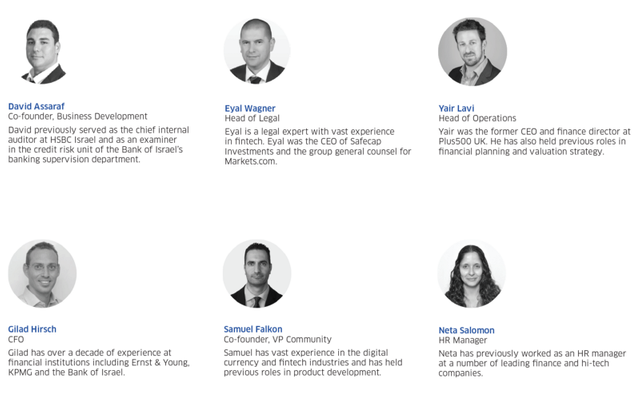
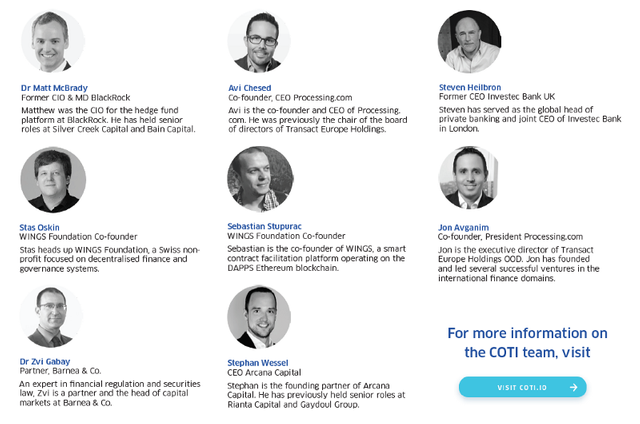
7. Roadmap
COTI’s roadmap sets out the key launch milestones that will shape development priorities between now and the end of 2021. The visual roadmap representation provided below is accompanied by detailed milestone explanations on the pages that follow.
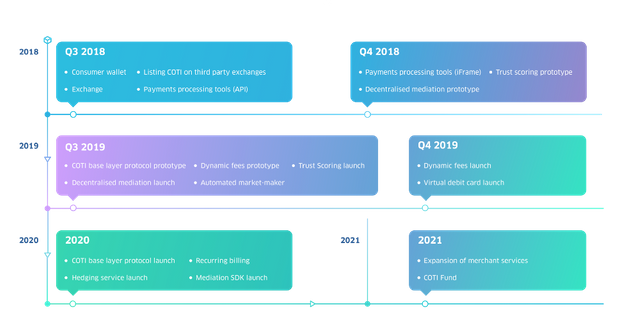
Development Progress to Date
Since its formation in early 2017, the COTI team has focused primarily on researching and developing the best purpose built solution for a digital payments network. The base layer protocol, modeled off of the DAG data structure, and the API for merchants are both in progress. COTI has also been working on developing its exchange infrastructure and consumer wallet offering and on defining the mechanics of its Trust Scoring Mechanism and Mediation System. The exchange and the consumer wallet are approaching completion and will be put to work this year.
Phase 1 Milestones — Q4 2018
The initial release of COTI’s services in Q4 2018 will be limited to testnet.
Consumer wallet prototype. The initial beta release of the consumer wallet will provide the baseline functionality of sending and receiving COTI coins and other digital currencies.
Full Node prototype. This will encompass a beta version of the Full Nodes to demonstrate COTI’s payment system functionality.
DSP Nodes prototype. Coinciding with the release of COTI’s Full Node prototype, a beta version of the Double Spend Prevention Node (DSP) will be rolled out to optimise standards for mitigating double-spending attacks.
History Node prototype. To provide a functional solution for the size management of a maturing DAG structure, a beta version of the History Nodes will be released along with the Clusterstamp algorithm.
Trust Score Server prototype. COTI will set the Trust Score Algorithm into motion and begin supplying Trust Scores to the Full Nodes.
Testnet launch. The COTI testnet will be launched based on the functional prototypes of the servers listed above.
Phase 2 Milestones — Q2 2019
COTI aims to achieve the following milestones in Q2 2019.
Consumer wallet launch. COTI’s release of the consumer wallet will kickstart the COTI ecosystem, providing consumers with the ability to send, receive, exchange and pay with multiple fiat and digital currencies, including COTI. The iOS, Android and web application will initially support USD, EUR, GBP, BTC, ETH and COTI, with additional support to be rolled out on an ongoing basis subject to network demand.
Launch of the Full Nodes, History Nodes and DSP Nodes. Users can begin to run their own independent Full Nodes, History Nodes and DSP Nodes.
Trust Score Server launch. At this stage, the Trust Score Servers will begin calculating Trust Scores in line with KYC/AML documentation and statistical parameters.
Decentralised mediation prototype. COTI will release a prototype of its decentralised mediation system and will begin optimising it with a select group of mediators and test users.
Mainnet launch. The network will begin to engage users to create wallets and run nodes. At this phase, COTI will be delivered to user wallets.
Phase 3 Milestones — Q4 2019
COTI aims to achieve the following milestones in Q4 2019.
KYC/AML Server launch. This component of the payment system will enable COTI to engage with international users and merchants by adhering to know your customer (KYC) and anti-money laundering (AML) requirements.
Decentralised mediation launch. Following extensive testing, COTI will implement its decentralised Mediation System, enabling mediators
to contribute to case resolution and to be compensated in COTI coins. To coincide with the launch of the decentralised Mediation System, COTI will launch a dedicated application enabling mediators to receive caseloads and contribute to the consensus-building process.
Payment processing tools (API). COTI’s initial release of its payment processing tools will provide merchants with the ability to accept payments from consumers holding COTI wallets and to access rich reporting and analytics. Merchants will be able to integrate COTI’s processing solutions via API and will be able to accept payments and receive payouts in various fiat and digital currencies, including COTI.
Payment processing tools (iFrame). COTI will release an iFrame that merchants can embed in their websites, thereby streamlining the technical integration process. The iFrame will enable COTI wallet registration to occur as part of the checkout process on COTI-powered merchants’ websites.
Exchange. In order to support consumer and merchant activity, COTI will simultaneously roll out its exchange solution, allowing the wallet and processing services outlined above to connect seamlessly to sources of liquidity when exchanging funds between different currencies.
Phase 4 Milestones — 2020
COTI aims to achieve the following milestones in 2020:
Debit card launch. COTI will launch virtual debit cards that enable COTI wallet-holders to spend from their wallets using the payments rails of major card networks. COTI users will be able to obtain these cards for a nominal issuance fee, and will not be required to pay any ongoing maintenance fees.
Hedging service launch. COTI will launch a hedging service that enables merchants to limit or eliminate their exposures to fluctuations in COTI’s market price.
Recurring billing. COTI will enable merchants to use COTI’s payment rails for recurring billing (e.g., subscription services).
Phase 5 Milestones — 2021
COTI aims to achieve the following milestones in the course of 2021:
Expansion of merchant services. COTI will launch additional merchant services, with a view to playing an increasingly central role in merchants’ payment affairs. These additional services will enable merchants to conduct an increasing array of operational functions, including payroll and supplier payments, through the COTI network.
COTI Fund. The launch of COTI’s Trust Scoring and Mediation SDKs will coincide with the launch of COTI’s Fund, a pool of capital that will inject funds into third party development projects that are building on top of COTI’s infrastructure. The Fund’s principals, who will be responsible for the allocations, will be determined in part by the COTI community’s preferences.
Mediation SDK launch. COTI will expand the reach of its network of mediators, and corresponding systems, by allowing authorised third party developers to connect to the network and leverage the decentralised mediation capabilities. For example, a third-party
payments network may wish to adopt COTI’s decentralised mediation system as an alternative to its existing centralised system. The SDK will make such integrations possible while enabling COTI to improve the system, both in terms of efficacy and cost-effectiveness.
COTI has set out an ambitious, yet achievable, development roadmap. This roadmap represents the COTI team’s current understanding of the launch sequence that will ensure the COTI network delivers the maximum achievable benefits to all network participants within the shortest amount of time possible. Notwithstanding the aforesaid, the COTI team is committed to working with the COTI community to expand or otherwise adjust the characterisation and prioritisation of the key milestones where necessary.
8. Risk Factors and Legal Disclaimers
Please refer to the full version of “Legal considerations, risks and disclaimers” published on www.coti.io to educate yourself regarding further legal disclaimers which govern this document.You are strongly advised to take independent legal advice with respect to the legality of the token sale in your jurisdiction. Please refer to literature references to the document version published on our website.
COTI community is continuing to grow at a rapid rate. If you have any questions, you are welcome to get in touch with us on Telegram or via email. We will be providing further updates in the near future.
i followed you :)